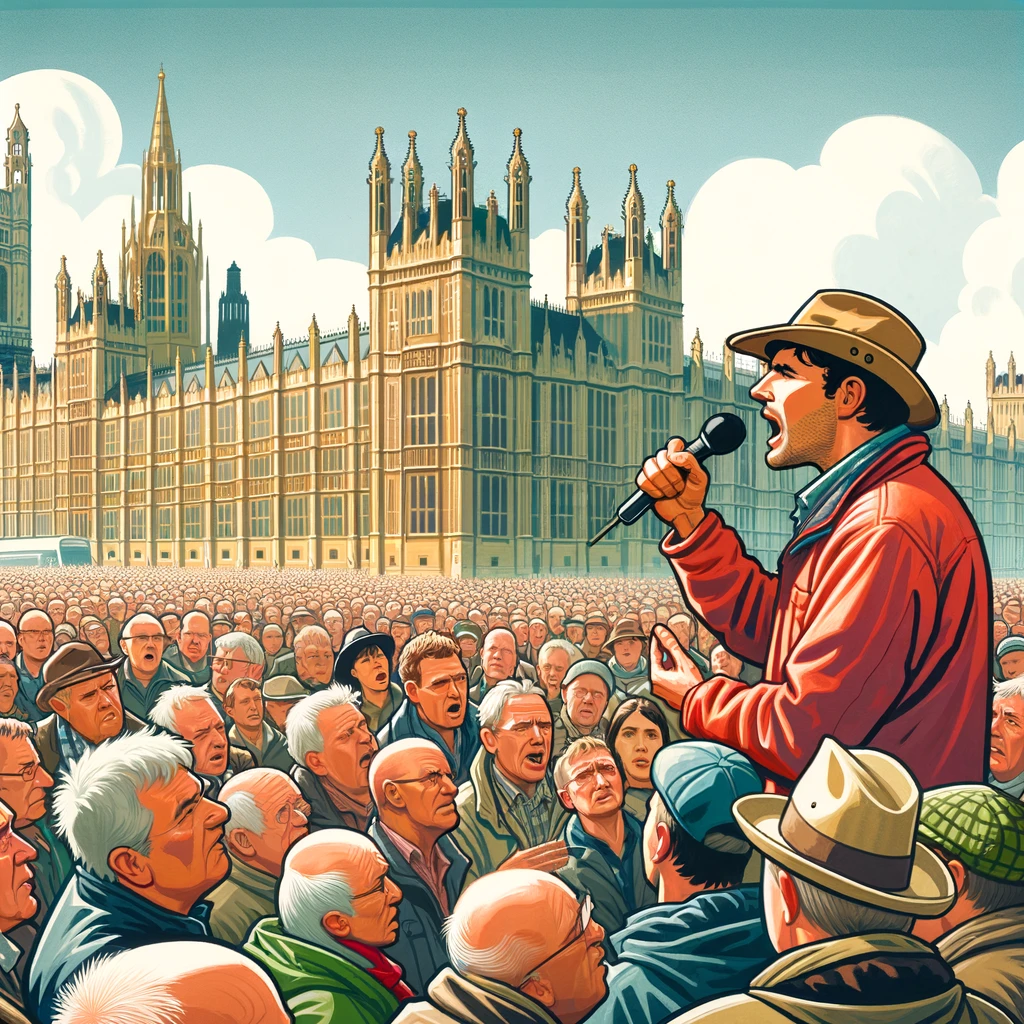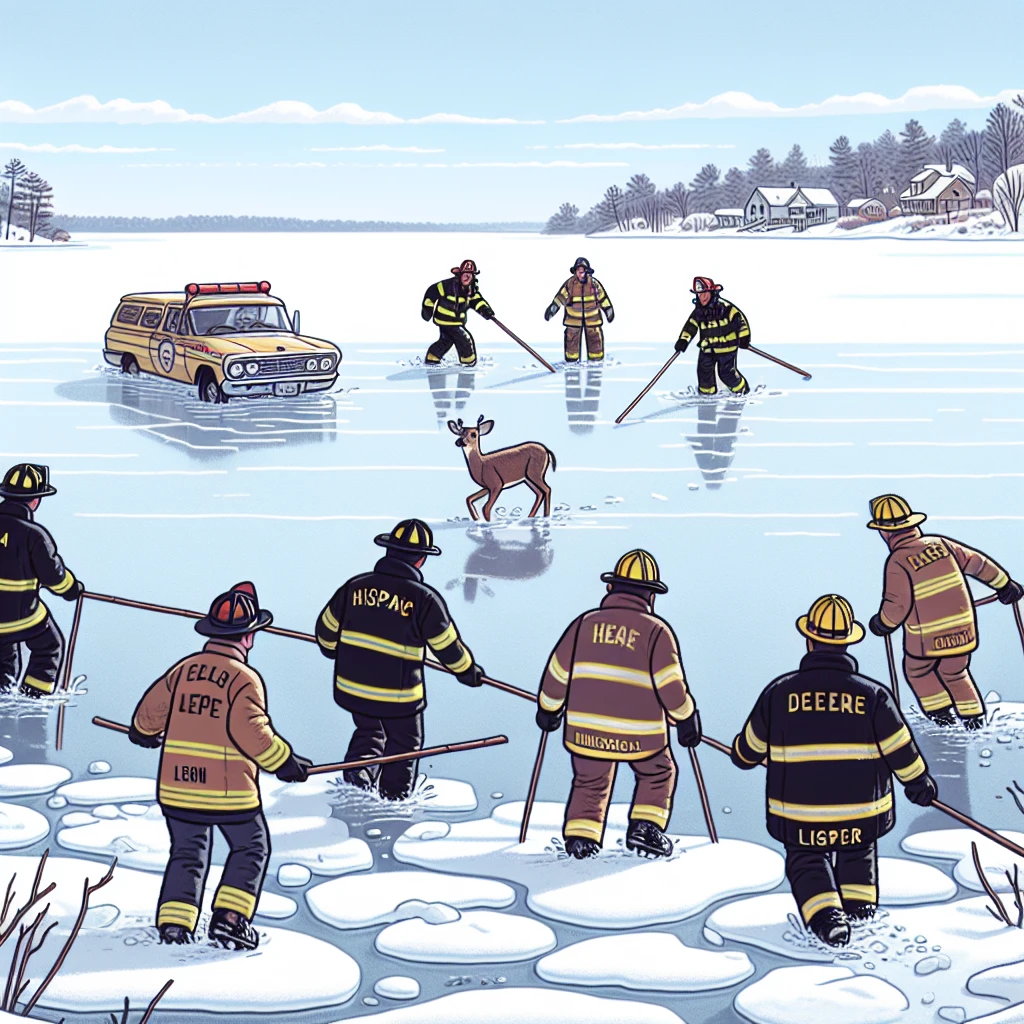More than 100 tractors gathered at the Houses of Parliament in London as farmers protested against the lack of support for UK food production. The farmers, organized by Save British Farming and Fairness for Farmers of Kent, expressed concerns about cheap food imports and unsupportive policies that they believe are endangering UK food security. The protest included tractors flying Union flags and carrying signs with slogans such as ‘Save British farming’ and ‘No farming, no food, no future’. Farmers from various parts of the UK, including Kent and Cornwall, participated in the rally.
The protest comes amidst a wave of demonstrations by farmers across Europe who are protesting against European Union regulations and cheap imports. In Wales, thousands of farmers have joined forces to fight new farm subsidy plans launched by the government. Farmers in England have also expressed their discontent with government agricultural policy, the Environmental Land Management farm payments scheme, weak trade deals, non-existent import controls, and misleading labeling, all of which they believe are undermining farming businesses and threatening the country’s ability to produce enough food.
Colin Rayner, a farmer attending the rally, expressed his concerns about the dire state of his business and the future of farming. He criticized the government’s focus on environmental initiatives at the expense of domestic food production and highlighted the lower standards of cheap imports. Rayner emphasized the importance of food security and the need to produce healthy, good-quality food from domestic resources.
Liz Webster, the founder of Save British Farming, called for a radical change in policy and an urgent exit from what she described as “appalling trade deals” that will harm British food production. The government has promised to support farmers and boost the country’s food security. Measures have been announced to limit the amount of land that can be taken out of food production and put into environmental schemes. The government also stated that at least 60% of the food consumed in the UK will continue to be produced domestically.
In conclusion, farmers in the UK have staged a protest in London to highlight their concerns about the lack of support for UK food production. They are worried about cheap food imports, unsupportive policies, and the impact on food security. The protest is part of a larger movement of farmers across Europe who are demonstrating against EU regulations and cheap imports. The government has promised to prioritize agriculture in trade deals and support farmers, but farmers are calling for a radical change in policy to protect British food production.
Original news source: Tractors brought to Parliament in farmers’ protest (BBC)
🎧 Listen:
Slow
Normal
Fast
📖 Vocabulary:
| 1 | tractors | Farm vehicles used for pulling heavy loads or machinery |
| 2 | slogans | Phrases used to convey messages or opinions in a concise way |
| 3 | rally | A large public gathering, often for a cause |
| 4 | subsidies | Financial support provided by the government to assist industries or businesses |
| 5 | discontent | A feeling of dissatisfaction or displeasure |
| 6 | scheme | A plan or program with a specific aim |
| 7 | labeling | The act of assigning names or categories to products |
| 8 | dire | Extremely serious or urgent |
| 9 | initiatives | Projects or plans intended to solve problems or improve conditions |
| 10 | domestic | Relating to or occurring within one’s own country |
| 11 | radical | Involving or making significant and fundamental changes |
| 12 | appalling | Shockingly bad or terrible |
| 13 | prioritize | To treat something as more important than other things |
| 14 | staged | Organized and performed as a public demonstration or protest |
| 15 | movement | A group of people working together to advance their shared political, social, or artistic ideas |
Group or Classroom Activities
Warm-up Activities:
– News Summary
Instructions: Divide the students into small groups. Give each group a few minutes to read the article. Then, instruct them to work together to create a concise summary of the article, highlighting the main points and key information. After they have finished, have each group share their summary with the class.
– Opinion Poll
Instructions: Prepare a series of questions related to the article. Divide the students into pairs or small groups and have them discuss and answer the questions. After a designated time, ask each group to share their opinions with the class. Encourage them to provide reasons and evidence to support their opinions.
– Vocabulary Pictionary
Instructions: Write a list of vocabulary words from the article on the board. Divide the students into pairs or small groups. Give each group a word and ask them to draw a picture that represents the word. The other groups must guess the word based on the drawing. Encourage the use of English to describe the picture and guess the word.
– Pros and Cons
Instructions: Divide the students into two groups. Assign one group the task of listing the pros or advantages of the issues discussed in the article (e.g. cheap food imports, environmental initiatives). Assign the other group the task of listing the cons or disadvantages. After they have completed their lists, have each group present their points to the class. Encourage respectful discussion and debate.
– Future Predictions
Instructions: In pairs or small groups, have the students discuss and make predictions about the future of UK food production based on the issues raised in the article. Ask them to consider the potential consequences of cheap food imports, unsupportive policies, and the focus on environmental initiatives. After they have discussed, ask each group to share their predictions with the class and explain their reasoning.
🤔 Comprehension Questions:
1. What were the farmers protesting against at the Houses of Parliament in London?
2. What are some of the concerns that the farmers have about the current agricultural policies?
3. What were some of the signs and slogans that the farmers had on their tractors during the protest?
4. Where did the farmers participating in the rally come from?
5. Why have farmers in Wales joined forces to fight new farm subsidy plans?
6. What specific aspects of government agricultural policy are farmers in England discontent with?
7. What did Colin Rayner criticize the government for focusing on instead of domestic food production?
8. What measures has the government announced to support farmers and boost food security in the UK?
Go to answers ⇩
🎧✍️ Listen and Fill in the Gaps:
More than 100 tractors gathered at the Houses of Parliament in London as farmers protested against the lack of support for UK food production. The farmers, organized by Save (1)______ Farming and Fairness for Farmers of Kent, expressed concerns about cheap food imports and unsupportive (2)______ that they believe are endangering UK food security. The protest (3)______ tractors flying Union flags and (4)______ signs with slogans such as ‘Save British farming’ and ‘No farming, no food, no future’. Farmers from various parts of the UK, including Kent and Cornwall, participated in the rally.
The protest comes amidst a wave of demonstrations by farmers across Europe who are protesting against (5)______ Union (6)______ and cheap imports. In Wales, thousands of farmers have joined forces to fight new farm subsidy plans launched by the government. Farmers in England have also expressed their (7)______ with government agricultural policy, the Environmental Land Management farm payments scheme, weak trade deals, non-existent import controls, and misleading labeling, all of which they believe are undermining farming (8)______ and threatening the country’s ability to produce enough food.
Colin Rayner, a farmer attending the rally, expressed his concerns about the dire state of his business and the future of farming. He criticized the government’s focus on environmental initiatives at the expense of domestic food (9)______ and highlighted the lower standards of cheap imports. Rayner emphasized the importance of food security and the need to produce healthy, good-quality food from domestic resources.
Liz Webster, the founder of Save British Farming, (10)______ for a radical (11)______ in policy and an urgent exit from what she (12)______ as “appalling trade deals” that will harm British food production. The government has promised to support farmers and boost the country’s food security. Measures have been announced to limit the amount of land that can be taken out of food production and put into environmental schemes. The government also stated that at least 60% of the food consumed in the UK will continue to be produced domestically.
In conclusion, farmers in the UK have staged a protest in (13)______ to highlight their concerns about the lack of (14)______ for UK food production. They are worried about cheap food imports, unsupportive policies, and the impact on food security. The protest is part of a larger movement of farmers across (15)______ who are demonstrating against EU regulations and cheap imports. The government has promised to prioritize agriculture in trade deals and support farmers, but farmers are calling for a radical change in (16)______ to protect British food production.
Go to answers ⇩
💬 Discussion Questions:
Students can ask a partner these questions, or discuss them as a group.
1. What is the importance of food security for a country?
2. How would you feel if you were a farmer and you saw cheap food imports flooding your market?
3. Do you think the government should prioritize environmental initiatives over domestic food production? Why or why not?
4. Why do you think farmers are concerned about misleading labeling?
5. How would you feel if your government made weak trade deals that negatively impacted your farming business?
6. Do you think it is important for a country to produce enough food domestically? Why or why not?
7. What is the role of subsidies in supporting farmers? Do you think they are necessary?
8. How would you feel if your government implemented policies that you believed were unsupportive of your industry?
9. What do you think are the potential consequences of relying heavily on cheap food imports?
10. How would you feel if your government prioritized trade deals over protecting domestic food production?
11. Do you think it is fair for farmers to protest against government policies? Why or why not?
12. What do you think are the challenges faced by farmers in today’s globalized economy?
13. How would you feel if you were a farmer and you saw your business struggling due to government policies?
14. Do you think the government should have more control over import controls and labeling regulations? Why or why not?
15. What do you think needs to change in government policy to better support farmers and protect food production?
Individual Activities
📖💭 Vocabulary Meanings:
Match each word to its meaning.
Words:
1. tractors
2. slogans
3. rally
4. subsidies
5. discontent
6. scheme
7. labeling
8. dire
9. initiatives
10. domestic
11. radical
12. appalling
13. prioritize
14. staged
15. movement
Meanings:
(A) Phrases used to convey messages or opinions in a concise way
(B) A large public gathering, often for a cause
(C) Involving or making significant and fundamental changes
(D) A plan or program with a specific aim
(E) Extremely serious or urgent
(F) Organized and performed as a public demonstration or protest
(G) Relating to or occurring within one’s own country
(H) A feeling of dissatisfaction or displeasure
(I) Shockingly bad or terrible
(J) Farm vehicles used for pulling heavy loads or machinery
(K) Projects or plans intended to solve problems or improve conditions
(L) A group of people working together to advance their shared political, social, or artistic ideas
(M) The act of assigning names or categories to products
(N) To treat something as more important than other things
(O) Financial support provided by the government to assist industries or businesses
Go to answers ⇩
🔡 Multiple Choice Questions:
1. What was the purpose of the protest at the Houses of Parliament in London?
(a) To protest against the lack of support for UK food production
(b) To support European Union regulations
(c) To advocate for cheap food imports
(d) To promote environmental initiatives
2. Which organizations organized the protest?
(a) European Union and Save British Farming
(b) Environmental Land Management and Fairness for Farmers of Kent
(c) Save British Farming and Fairness for Farmers of Kent
(d) Save British Farming and European Union
3. What were the farmers protesting against in Wales?
(a) Lack of support for UK food production
(b) European Union regulations
(c) Cheap food imports
(d) New farm subsidy plans launched by the government
4. What concerns did farmers in England express?
(a) Lack of support for UK food production and cheap food imports
(b) Environmental initiatives and non-existent import controls
(c) European Union regulations and misleading labeling
(d) Government agricultural policy, weak trade deals, and misleading labeling
5. What did Colin Rayner criticize the government for?
(a) Focusing on environmental initiatives at the expense of domestic food production
(b) Supporting farmers and boosting the country’s food security
(c) Limiting the amount of land that can be taken out of food production
(d) Promising to produce at least 60% of the food consumed in the UK domestically
6. What did Liz Webster call for?
(a) More environmental initiatives and support for domestic food production
(b) Limiting the amount of land that can be taken out of food production
(c) A radical change in policy and an urgent exit from “appalling trade deals”
(d) Producing at least 60% of the food consumed in the UK domestically
7. What measures has the government announced to support farmers and boost food security?
(a) Supporting environmental initiatives at the expense of domestic food production
(b) Limiting the amount of land that can be taken out of food production and putting it into environmental schemes
(c) Promising to produce at least 60% of the food consumed in the UK domestically
(d) Prioritizing agriculture in trade deals and supporting farmers
8. What is the main concern of the farmers in the UK?
(a) European Union regulations and cheap imports
(b) Lack of support for UK food production and the impact on food security
(c) Environmental initiatives and non-existent import controls
(d) Lack of support for environmental schemes and misleading labeling
Go to answers ⇩
🕵️ True or False Questions:
1. Farmers in England have expressed discontent with government agricultural policy, weak trade deals, non-existent import controls, and misleading labeling.
2. The farmers were mobilized by Preserve British Farming and Justice for Farmers of Kent.
3. The protest featured tractors displaying Union flags and holding signs with slogans like ‘Protect British agriculture’ and ‘No farming, no food, no survival.’
4. Farmers in Wales have united to support new farm subsidy proposals introduced by the government.
5. The government has promised to support farmers and boost the country’s food security, but farmers are calling for a radical change in policy to protect British food production.
6. The protest is a stand-alone event by farmers throughout Europe who are voicing their approval of EU regulations and affordable imports.
7. Farmers from various parts of the UK, including Kent and Cornwall, participated in the rally.
8. More than 100 tractors gathered at the Houses of Parliament in London as farmers protested against the lack of support for UK food production.
Go to answers ⇩
📝 Write a Summary:
Write a summary of this news article in two sentences.
Check your writing now with the best free AI for English writing!
Writing Questions:
Answer the following questions. Write as much as you can for each answer.
Check your answers with our free English writing assistant!
1. What are the main concerns of UK farmers regarding food production?
2. Why are farmers protesting against European Union regulations and cheap imports?
3. How are farmers in Wales fighting against new farm subsidy plans?
4. What specific issues do farmers in England have with government agricultural policy?
5. What measures has the UK government announced to support farmers and boost food security?
✅ Answers
🤔✅ Comprehension Question Answers:
1. The farmers were protesting against the lack of support for UK food production.
2. The farmers have concerns about cheap food imports and unsupportive policies that they believe are endangering UK food security.
3. Some of the signs and slogans that the farmers had on their tractors during the protest included ‘Save British farming’ and ‘No farming, no food, no future’.
4. The farmers participating in the rally came from various parts of the UK, including Kent and Cornwall.
5. Farmers in Wales have joined forces to fight new farm subsidy plans because they believe it will harm their businesses.
6. Farmers in England are discontent with government agricultural policy, the Environmental Land Management farm payments scheme, weak trade deals, non-existent import controls, and misleading labeling.
7. Colin Rayner criticized the government for focusing on environmental initiatives at the expense of domestic food production.
8. The government has announced measures to limit the amount of land that can be taken out of food production and put into environmental schemes. They also stated that at least 60% of the food consumed in the UK will continue to be produced domestically.
Go back to questions ⇧
🎧✍️✅ Listen and Fill in the Gaps Answers:
(1) British
(2) policies
(3) included
(4) carrying
(5) European
(6) regulations
(7) discontent
(8) businesses
(9) production
(10) called
(11) change
(12) described
(13) London
(14) support
(15) Europe
(16) policy
Go back to questions ⇧
📖💭✅ Vocabulary Meanings Answers:
1. tractors
Answer: (J) Farm vehicles used for pulling heavy loads or machinery
2. slogans
Answer: (A) Phrases used to convey messages or opinions in a concise way
3. rally
Answer: (B) A large public gathering, often for a cause
4. subsidies
Answer: (O) Financial support provided by the government to assist industries or businesses
5. discontent
Answer: (H) A feeling of dissatisfaction or displeasure
6. scheme
Answer: (D) A plan or program with a specific aim
7. labeling
Answer: (M) The act of assigning names or categories to products
8. dire
Answer: (E) Extremely serious or urgent
9. initiatives
Answer: (K) Projects or plans intended to solve problems or improve conditions
10. domestic
Answer: (G) Relating to or occurring within one’s own country
11. radical
Answer: (C) Involving or making significant and fundamental changes
12. appalling
Answer: (I) Shockingly bad or terrible
13. prioritize
Answer: (N) To treat something as more important than other things
14. staged
Answer: (F) Organized and performed as a public demonstration or protest
15. movement
Answer: (L) A group of people working together to advance their shared political, social, or artistic ideas
Go back to questions ⇧
🔡✅ Multiple Choice Answers:
1. What was the purpose of the protest at the Houses of Parliament in London?
Answer: (a) To protest against the lack of support for UK food production
2. Which organizations organized the protest?
Answer: (c) Save British Farming and Fairness for Farmers of Kent
3. What were the farmers protesting against in Wales?
Answer: (d) New farm subsidy plans launched by the government
4. What concerns did farmers in England express?
Answer: (d) Government agricultural policy, weak trade deals, and misleading labeling
5. What did Colin Rayner criticize the government for?
Answer: (a) Focusing on environmental initiatives at the expense of domestic food production
6. What did Liz Webster call for?
Answer: (c) A radical change in policy and an urgent exit from “appalling trade deals”
7. What measures has the government announced to support farmers and boost food security?
Answer: (b) Limiting the amount of land that can be taken out of food production and putting it into environmental schemes
8. What is the main concern of the farmers in the UK?
Answer: (b) Lack of support for UK food production and the impact on food security
Go back to questions ⇧
🕵️✅ True or False Answers:
1. Farmers in England have expressed discontent with government agricultural policy, weak trade deals, non-existent import controls, and misleading labeling. (Answer: True)
2. The farmers were mobilized by Preserve British Farming and Justice for Farmers of Kent. (Answer: False)
3. The protest featured tractors displaying Union flags and holding signs with slogans like ‘Protect British agriculture’ and ‘No farming, no food, no survival.’ (Answer: False)
4. Farmers in Wales have united to support new farm subsidy proposals introduced by the government. (Answer: False)
5. The government has promised to support farmers and boost the country’s food security, but farmers are calling for a radical change in policy to protect British food production. (Answer: True)
6. The protest is a stand-alone event by farmers throughout Europe who are voicing their approval of EU regulations and affordable imports. (Answer: False)
7. Farmers from various parts of the UK, including Kent and Cornwall, participated in the rally. (Answer: True)
8. More than 100 tractors gathered at the Houses of Parliament in London as farmers protested against the lack of support for UK food production. (Answer: True)
Go back to questions ⇧















